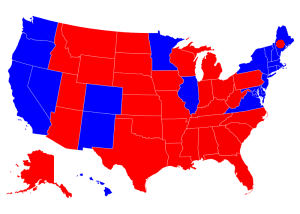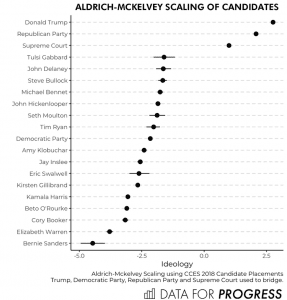Understanding Ideological Labels
February 20, 2020 by
 During campaigns and elections, candidates use political labels, such as liberal, moderate, progressive, conservative, and libertarian, to position themselves in relation to each other and as a shorthand for their worldviews and policy preferences. This presidential election cycle features candidates from across a wider political spectrum than most elections in recent years.
During campaigns and elections, candidates use political labels, such as liberal, moderate, progressive, conservative, and libertarian, to position themselves in relation to each other and as a shorthand for their worldviews and policy preferences. This presidential election cycle features candidates from across a wider political spectrum than most elections in recent years.
In the United States, we often discuss a left-right political ideologies spectrum that might look something like this:
Socialist –> Progressive –> Liberal –> Moderate –> Conservative –> Libertarian –> Autocratic
This political ideology spectrum is confusing for several reasons. First, the far right includes both small government libertarian and autocratic/authoritarian political beliefs. Second, ideological labels such as socialist and libertarian are not commonly used and understood in the United States, although that is changing. This post offers some resources to help teachers and students explore political beliefs and values.

Our debates in the United States take place within a small slice of the available political ideologies. To help your students explore the full range of ideas, and to see how our political debates compare to those in other countries, consider exploring The Political Compass, created by Pace News and journalist Wayne Brittenden.1
Additional Resources
- Our Political Values Lesson Plan helps students understand how competing values and goals animate public policy deliberations and why it is so difficult for the public to reach agreement on political issues. Students will identify and begin to evaluate values that are frequently in tension in political debates.
- The Atlantic: The 2020 U.S. Presidential Race: A Cheat Sheet
- Business Insider: Here’s How Americans Rank the 2020 Presidential Candidates on the Political Spectrum
- University of Virginia Center for Politics: Democrats’ Dilemma: Ideology, Electability, and the 2020 Presidential Nomination in Iowa and the Nation
- Political Ideology Quizzes:
- The Political Compass Quiz can be used by teachers or shared with with advanced high school students, to see where you/they fall on the political compass.
- For a shorter, more accessible quiz, see the Pew Research Center’s Political Typology Quiz. This quiz is only 17 questions.
- A longer quiz that focuses on specific current policy issues and connects students’ beliefs to candidates is I Side With’s 2020 Presidential Quiz.
Discussion Questions
- Do these political labels help you make sense of debates between the candidates? Why or why not?
- Which political label do you think best describes you? Why?
- When you think about candidates, how important is winning? Is it more important than political values?
- What political goals are most important to you? What political values?
Featured Image Credit: Wikimedia Commons: https://commons.wikimedia.org/wiki/File:2016-election-map.svg
[1] Quartz.com: https://qz.com/1748903/how-2020-us-democratic-candidates-compare-to-global-politicians/







